Walking outside, we often find ourselves judging the reliability and safety of the floors and whether the material and style can ensure that the road won’t fall and eat us inside. Therefore you would have noticed the different kinds of paving blocks often used to ensure smooth movement, sturdiness of the structures in handling heavy loads, and a superior appeal of the space.
Post your Requirement
Paver blocks, also known as paving blocks or pavement blocks, are some of the most used building materials for block paving applications, serving spaces like driveways, outdoor spaces, walkways, and other uses. Available in a wide variety of colours, patterns, and design options, these interlocking paver blocks allow you to choose the best sort of blocks to help meet your unique expectations.
What Are Paving Blocks?
The paver block industry has witnessed significant growth in the last few decades in the construction industry due to its extensive role in diverse residential, commercial, and infrastructural projects. The paver or paving blocks refer to the compact, pre-cast structures made with materials such as concrete, clay, or stone typically used to create surfaces for walkways, driveways, patios, and other kinds of outdoor areas.
Paving blocks are some of the popular choices in the modern construction industry due to their superior strength, design versatility and options, and ease of installation of the structures. The most common types of pavement blocks include concrete interlocking blocks that provide a durable and aesthetically pleasing alternative to traditional options. Other common types of materials often include options like clay, porcelain, and even natural stone that offer their own unique set of aesthetic appeal and durability standards. The pavement blocks are often put on a gravel or sand substrate, and tightly interlocked to prevent displacement and the joints are also filled with sand to ensure proper locking and long-term reliability.
Read Also: Types Of Building Materials Used In Construction
Types Of Paving Blocks
There are a variety of paving block types based on material, finishes, designs, or even shapes. Each of the paving block types is designed to meet the specific needs and requirements of the clients and thus you need to have a brief understanding of them to make an informed decision for your space. Some of the common types of paving blocks include the following:
1. Concrete Pavement Blocks
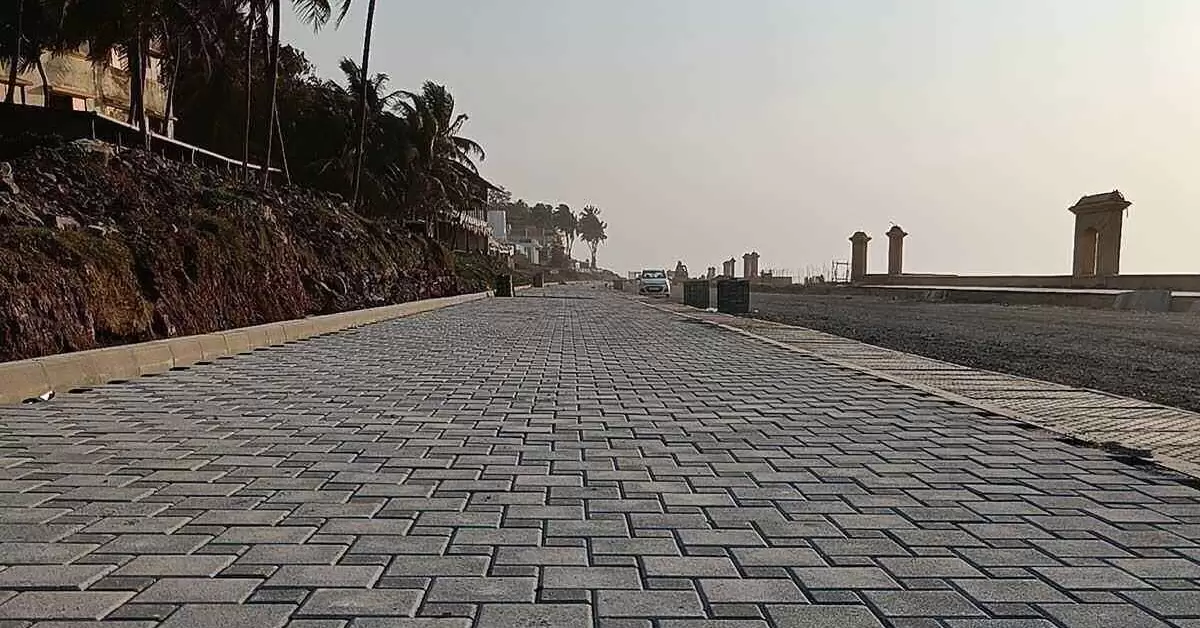
Everyone knows about concrete paver blocks, you must have seen them in one place or another. Concrete pavement blocks are the most widely used options due to their high levels of strength and durability in the long run. These are the kinds of blocks that are manufactured from materials including cement, aggregates, and water, molded under pressure and vibration to ensure standard sizes and uniform installation of the structures.
This kind of pavement block is often available in interlocking or non-interlocking paver styles, as hollow or solid concrete blocks, and in shapes such as the zigzag, I-shape, T-shape, rectangular, hexagonal, or numerous others. The hard nature of concrete and the strong and durable nature of the material make these blocks an ideal choice for heavy loads or high-traffic areas such as patios, driveways, and others. There are diverse options in terms of colours and patterns as well, you can choose based on your requirements and preferences.
2. Clay Pavement Blocks
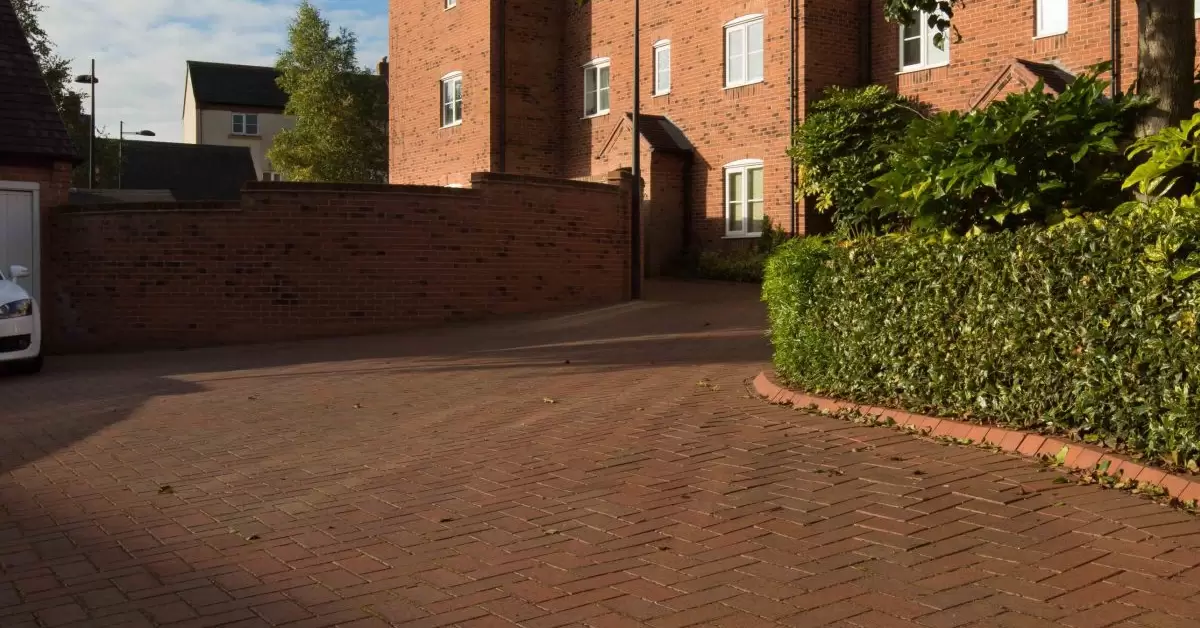
One of the best choices for environmentally conscious clients, the clay paver blocks are aesthetically pleasing pavement blocks that are made by firing the natural clay in kilns. This is a kind of pavement block that has been historically used for the surfaces of walkways, patios, courtyards, and other areas to create a warm, traditional look of elegance.
As it is produced from organic clay soil, its form is usually not uniform and thus offers an incredible range of options in terms of design flexibility and customization. The material stays true to its colour and does not degrade like coloured concrete. They offer higher standards of durability and are predominantly used as ornamental embellishments due to the authentic sense of historical allure they add to the structures.
3. Plastic Pavement Blocks
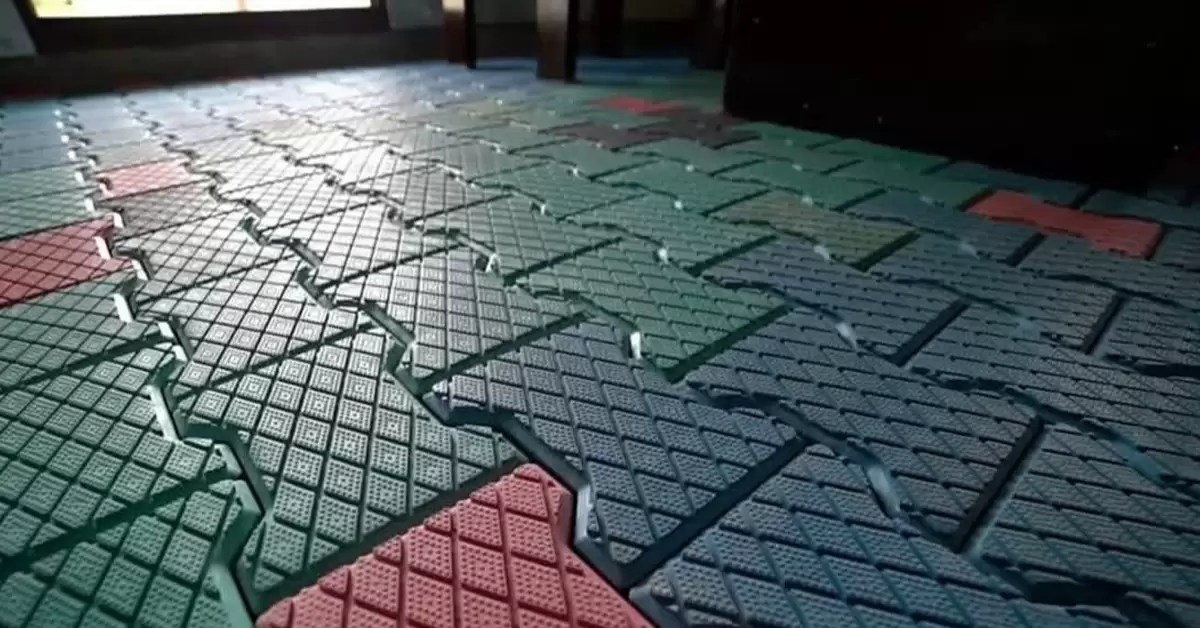
These are the kinds of environmentally friendly block pavers that are typically made with recycled plastic waste ensuring a sustainable solution for diverse applications. The material offers a lightweight and strong choice that offers the benefits of weather-resistance and cost-effective qualities for the people. As it is widely known, the material composition of plastic pavement blocks ensures resistance to moisture damage, the ability to withstand extreme temperatures, and resistance to cracking. Additionally, the Pavement Block Price for this kind of style makes them a value-for-money investment for a wide variety of low-traffic regions.
4. Stone Pavement Blocks
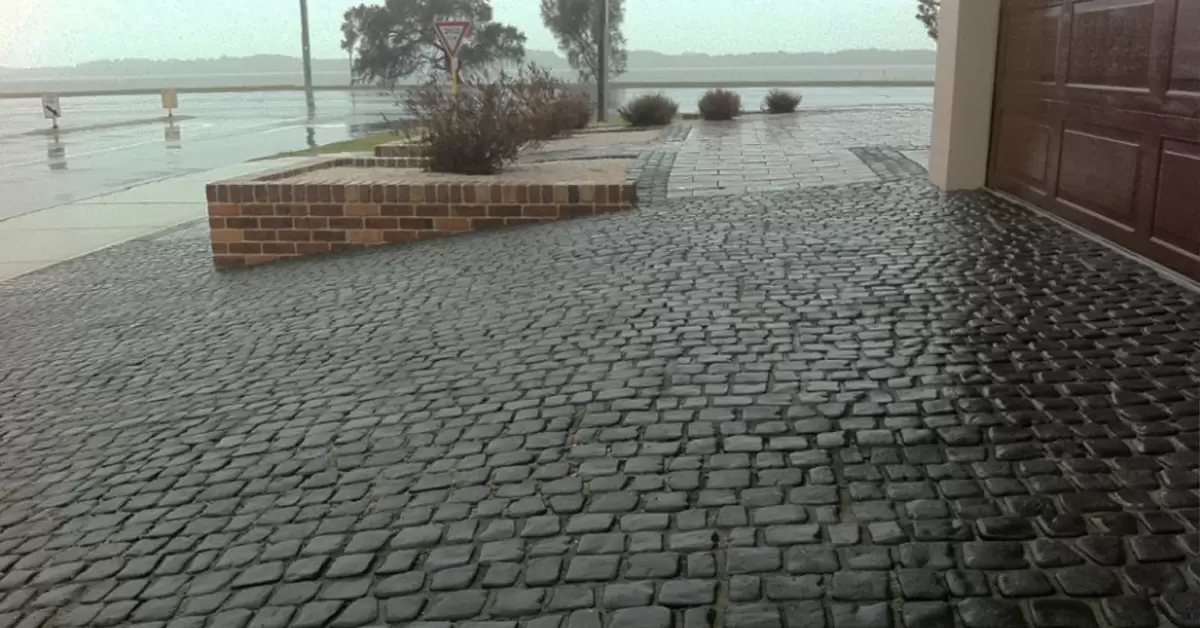
This is one of the smartest ways to build your surfaces with an elegant feel of high-end finishes and a dignified appearance. The natural stone paver blocks are typically made with stones carved from quarries and cut and crafted to get the distinct shapes and patterns of the structures. This is a kind of approach that offers exceptional standards of strength and durability along with high-end finishes that can maintain their lustre and feel without regular upkeep needs. Each stone is unique and thus features its own set of design options, patterns, and colour variation options, you need to invest in one that you consider the most effective for your project. The Paver Block Rate Per Sq for this kind of design is often higher as compared to other options but the durability of the structures makes them an ideal option for high-traffic areas.
5. Rubber Pavement Blocks
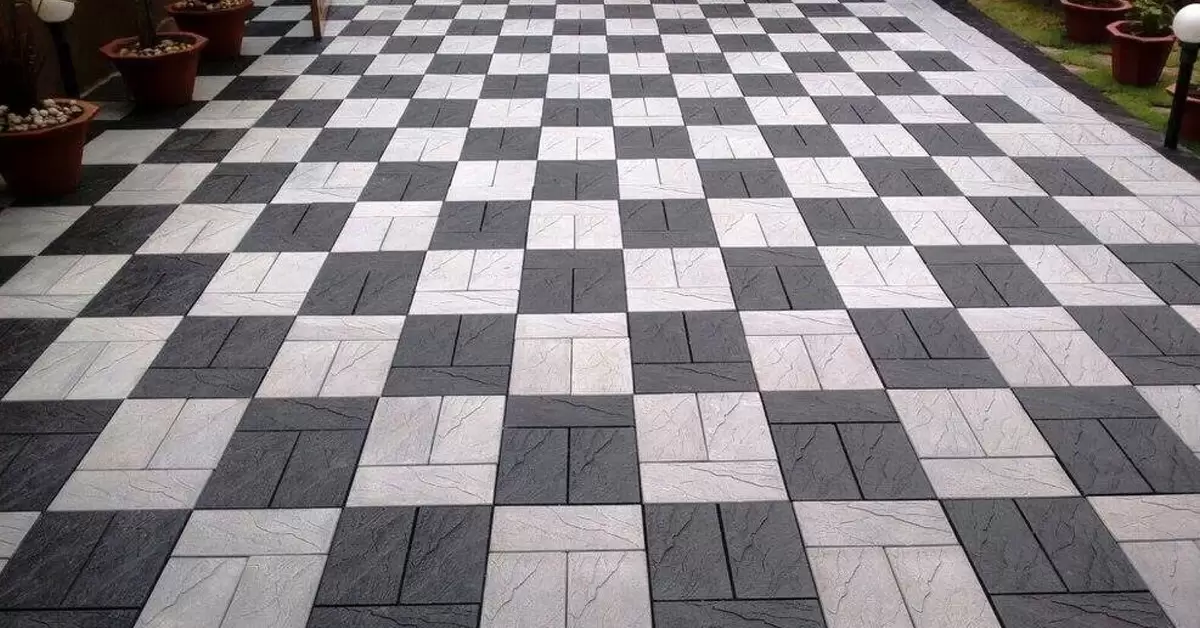
As an effective eco-friendly approach, this is a kind of style where the pavement blocks are made with recycled rubber and are typically popular for regions where safety is one of the essential concerns. These blocks are typically made of recycled rubber and thus are lightweight, robust, and possess a shock-resistant design. These designs can be used for playgrounds or high-traffic areas with their superior durability standards, softness in texture, and reliability in designs. You can also benefit from the waterproof and slip-resistant capabilities of the structures and the diverse options for colour combination also add to its grave and beauty. Some of the common applications include outdoor patio floor covering, deck flooring, pool decking, walkway pathing, and numerous others.
6. Regular Pavement Blocks
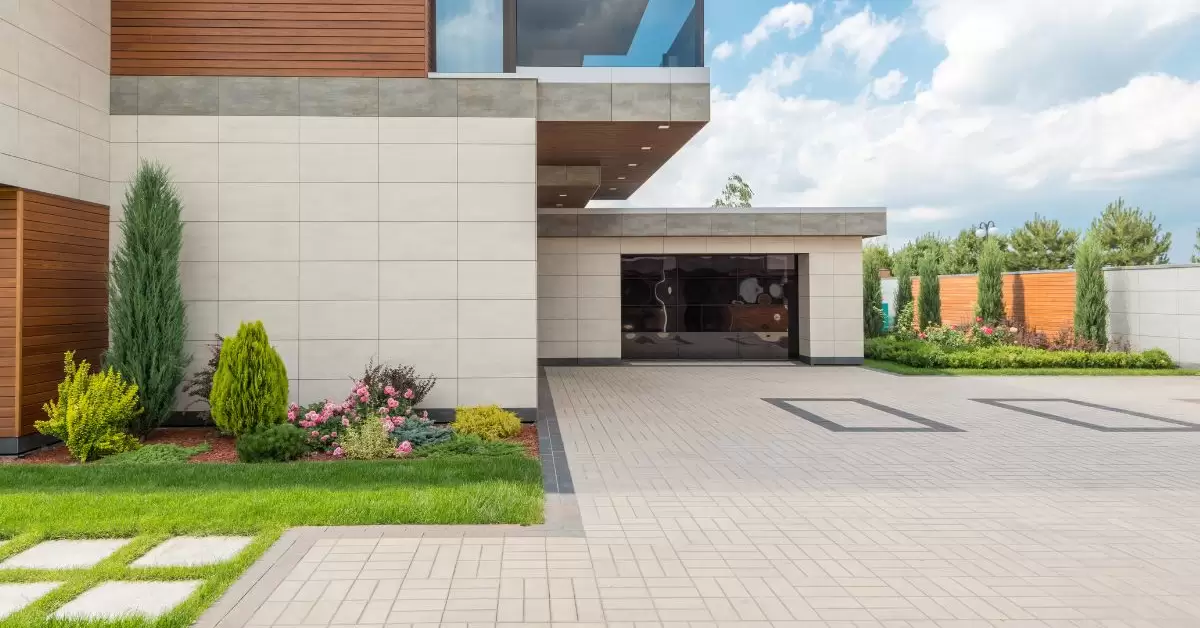
This is a kind of design of the pavement blocks that typically features an interlocking design of the concrete paver blocks where the blocks are attached tightly and thus offer superior standards of strength and durability in the long run. The interlocking edges allow them to offer efficiency in heavy load applications and also help to prevent any gradual displacement in the long run. They are usually aesthetically pleasing and ensure the long-term performance of the structures even in high-traffic areas such as parking areas, footpaths, driveways, walkways, patios, and diverse other spaces. Their upkeep needs are typically low and offer a prolonged lifespan with an incredible look.
7. Permeable Paver Blocks
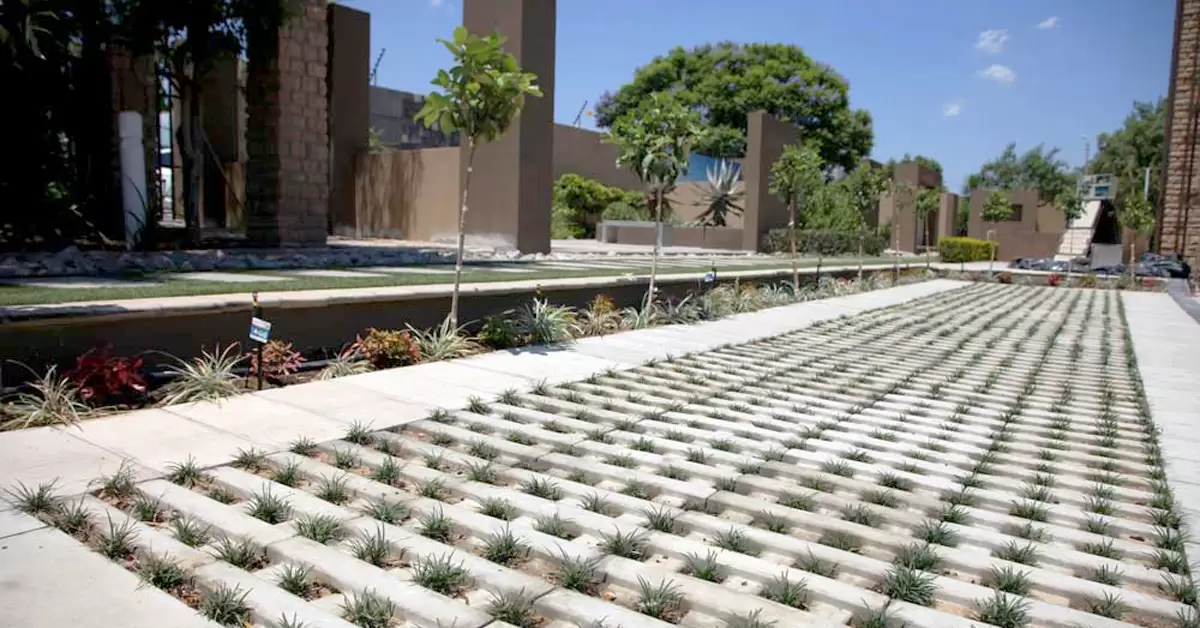
This is one of the most innovative options particularly viable for heavy rains or flood-prone regions as these are the kinds of pavement block designs that allow the water to drain between them. This design features gaps or porous materials that allow the water to pass through them thereby reducing the surface runoff of the water. This proves to be an eco-friendly and sustainable approach that contributes to the recharge of groundwater and also promotes sustainable drainage systems. They also contribute to the prevention of waterlogging, erosion, and gradual risks of floods in the region.
Standard Shapes And Sizes Of Pavement Blocks
There is a wide range of shapes and size options for pavement blocks typically based on their geometry and applications. These options are defined as per standards like IS 15658:2006 (India) for precast concrete blocks. Some of the common options include the following:
- Type A Paver Blocks: This is a kind of shape of the paving blocks that feature the plan vertical faces that do not interlock when installed next to each other. These are the non-interlocking paver blocks that are laid in a sand-setting bed and offer superior versatility in applications such as patios, borders, walkaways, and others. They offer flexibility in operations and can also be used in combination with interlocking pavement types.
- Type B Paver Blocks: This type features a unique combination of plain and curved/corrugated vertical faces that interlock with the curved or corrugated faces. There are small gaps in this design that separate the plain side of the structures and its overall structure promotes higher standards of stability in the long run. This design features a partial interlocking system along with curved edges that help to create a unique visual appeal and impress every eye it meets. This type is particularly suitable for patios, walkways, or driveways and can be made with materials like stone, clay or concrete based on your personal preferences.
- Type C Paver Blocks: This is a completely interlocked design that has all faces curved or corrugated which key into each other along all the vertical faces when paved. Their high standards of strength and stability make them a great choice for heavy-traffic or heavy-load locations such as driveways, [arking lots, roadways, and other spaces. They possess a self-locking capability and the interlocked grid even without mortar ensures long-lasting pavement design.
- Type D Paver Blocks: This includes the type of designs that are uniquely shaped as letters like “L”, or “X” blocks with corrugated faces that are fully interlocked with distinct geometric patterned looks. This kind of design is mainly used for decorative purposes such as accents, borders, patios, or even walkways. You can choose materials such as clay, concrete, tumbled glass, or natural stone depending on your functionality, strength, and aesthetic requirements.
Benefits Of Paving Blocks
The different types of paving blocks prove to be durable choices that can withstand heavy loads and extreme temperatures without cracking or deteriorating. They are ideal for driveways, roads, parking areas, and diverse other spaces due to their incredible qualities that serve as reliable benefits of the structures.
- Superior Quality Standards: The different kinds of paver blocks are produced in a factory that provides uniform quality and durability in these structures. Whether you go for concrete, clay, stone, or any other material for the paver blocks, their design and strength standards ensure their long-term performance and durability. Additionally, their ability to withstand heavy loads and diverse climate profiles further add to their reliability in the long run.
- Design Versatility: The pavement blocks come with a wide range of customization options in terms of colours, designs, textures, and other necessary parameters. Therefore you have the flexibility to build an ideal design for spaces ranging from a traditional garden to modern roadways without the restriction of limited options. You can get a customized design tailored to meet your specific needs.
- Easy to Use: The paver block designs often take more time to install but they often offer the benefit of easy installation. They also offer the benefit of immediate use after installation. They do not require a great amount of time to gain strength and can be used almost immediately after installation. Additionally, you can easily repair these structures on a to-element basis rather than repairing the whole structure which takes an extensive amount of time and effort.
- Low Maintenance: One of the key qualities of the paver blocks is that they are easy to clean and maintain. They can maintain their good look without regular maintenance. Additionally, they can be easily replaced by removing just one element and not disturbing the whole structure. The materials of concrete and clay are hard to discolour and the structures can be easily maintained without extensive work.
- Cost Effective: The upfront tag of the pavement block prices can be a bit higher as compared to other potential options, however, the long-term performance and durability of the structures make up for the costs. In the long run, the pavement tiles prices serve to be a cost-effective and worthy investment due to the wide range of superior features.
- Environment Friendly: Some options among the different paving block types prove to be highly environmentally friendly due to their ability to lessen the amount of runoff generated and also to support the recharge of groundwater making them a remarkable choice for urban pavements. Opting for such options further adds to their performance and reliability in the long run.
- Stable and Weather Resistant: The different paver block designs prove to be more stable and resistant to cracking and buckling better than poured concrete due to their ability to withstand diverse temperature conditions. This allows the structures to not contract or expand in different conditions and also ensures their smooth and working surface in the long run.
Costs Of Paving Blocks
|
Paving Block Types |
Paver Block Rate Per Sq Ft |
| Concrete Pavement Blocks | ₹100 to ₹1,500 per square foot |
| Clay Pavement Blocks | ₹200 to ₹2,000 per square foot |
| Natural Stone Pavement Blocks | ₹500 to ₹2,500 per square foot |
| Plastic Pavement Blocks | ₹100 to ₹800 per square foot |
| Rubber Pavement Blocks | ₹150 to ₹1,000 per square foot |
| Regular Pavement Blocks | ₹300 to ₹450 per square foot |
| Permeable Paver Blocks | ₹300 to ₹1,500 per square foot |
Ideal Applications Of Paving Blocks
The different paver block designs are aesthetically pleasing and durable and come with high standards of versatility in applications. Some of the common applications of the different types of paving blocks include the following:
- Driveways: Natural stone or concrete paver tiles can be effectively used for the building of different kinds of driveways that can withstand heavy vehicle loads. They can offer long-term durability even with heavy loads and regular use.
- Walkways And Pathways: You can go for glass or clay blocks for the building of walkways and pathways due to their water-absorbing capacity, their aesthetic appeal, and the overall functionality that makes them a reliable option in the long run.
- Patios And Courtyards: The impressive features and capabilities the structures offer along with the affordable paver tiles price structure make them a captivating choice for outdoor living spaces as well. You can create an elegant look of luxury with the unique designs of clay or natural stone paving blocks.
- Parking Lots: The parking areas are large areas that require high levels of strength and load-bearing capacity due to the regular movement of vehicles and other heavy load elements. For such purposes, you can go for concrete paver tiles due to their competitive prices and incredible levels of durability and performance.
- Garden And Landscaping: With the high demands of aesthetic appeal and long-term reliability, gardens and landscape pavements are structures that one wants to be the best. They serve as the first impression for diverse spaces and thus if you go for natural stone or grass pavement blocks for such spaces, it will incredibly add to the overall appearance and comfort of spaces.
|
Purpose |
Paver Block Types |
Key Considerations |
| Driveways | Interlocking Concrete Pavers | High durability, load-bearing, anti-slip surface. |
| Patios & Pathways | Flagstone or Natural Stone | Aesthetic appeal, non-slip, decorative. |
| Garden Walkways | Grass Pavers | Permeable, eco-friendly, blends with greenery. |
| Pool Decks | Porous Pavers | Slip-resistant, water drainage, heat-resistant. |
| Parking Lots | Heavy-duty Concrete Pavers | High compressive strength, and load resistance. |
| Public Walkways | Brick Pavers | Durable, aesthetic, and weather-resistant. |
| Paths | Stone Pavers, Gravel Pavers | Permeability, durability. |
| Terraces & Rooftops | Lightweight Pavers | Light, easy to install, water drainage. |
| Edging | Clay pavers, Plastic Composite Edging | Restraint from edges, durable, low-maintenance. |
| Outdoor Sports Areas | Rubber Pavers | Superior bsorption, slip-resistant. |
Opt For Highest Quality Pavement Blocks For Reliable Structures
The different types of paver blocks are sturdy, customizable, and adaptable structures that offer suitability to a diverse range of applications. However, ensuring the long-term reliability of the structures is not the same as searching for the best paver block near me, it requires dedicated efforts and analysis of a wide range of factors. For the easiest approach, you should refer to the platform of McCoy Mart and compare the different brands and options for paver blocks and choose the one that suits your needs best. McCoy Mart has built a reputation for quality and innovation in the industry due to its customer-centric approach that prioritizes customer satisfaction.
Read Also: A Comprehensive Guide To Understanding Paver Blocks

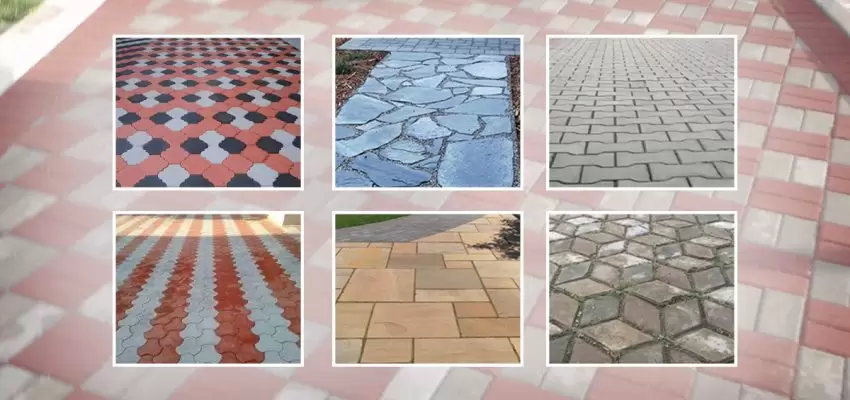
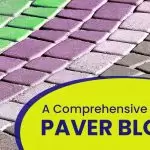


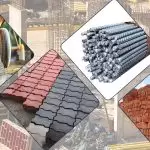

















Post A Comment